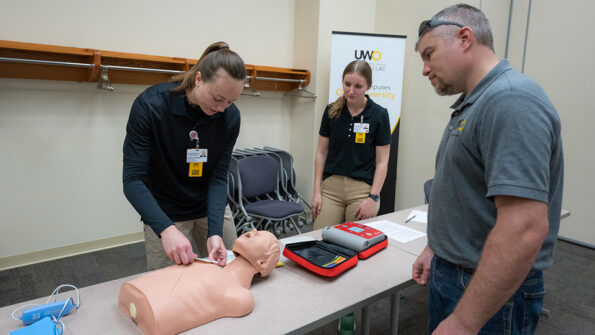Knowing what to do in an emergency can mean the difference between life and death.
University of Wisconsin Oshkosh senior nursing students recently shared lifesaving skills with faculty and staff and several students at UW Oshkosh’s Fond du Lac and Fox Cities campuses.
The presentations on the use of automated external defibrillators (AED) and Stop the Bleed tourniquets were designed to provide awareness and the confidence to act in vital initial moments until trained professionals arrive.
“We educated a total of 30 participants. All had great feedback and felt they were now able to at the very least initiate emergency interventions,” said Rebecca Stephani, the instructional academic staff member who led the clinical group of students from the College of Nursing.
Eight students enrolled in the 400-level Family and Community Nursing Clinical course split up to train at the two access campuses.
Mackenzie Bennett, Amber Huser, Paige Larson and Julie Weber were in Fond du Lac April 13; Zain Mihyar, Mikayla Murphy, Sophia Nielson and Allison Smith presented at Fox Cities campus April 6.
The students have one semester remaining in their program and will graduate in December with nursing bachelor’s degrees.

UWO nursing students held emergency intervention training for faculty, staff and others at the Fond du Lac campus Thursday.
Confidence to act
The American Heart Association notes sudden cardiac arrest is the leading cause of death in the United States, with the majority of the cardiac events happening outside hospitals. Survival rate dramatically increases when an AED is used within the first minute, but bystanders often are afraid to help in fear of doing something wrong or causing further damage.
The UWO nurses hope to help people feel comfortable enough to begin life-saving measures if put in that situation.
AED and Stop the Bleed tourniquets—which help an individual with a penetrating wound—are available at many public locations. The training provided information on safe use related to the patient and the rescuer. Demonstrations and hands-on practice were an important part of the presentations.
“It was determined via a survey, that most faculty and staff know where to find emergency equipment on campus but do not feel comfortable using it,” Stephani said. “This semester, a focus was placed on educating and training the faculty, staff and students of UW Oshkosh’s access campuses on the basics of AED use and Stop the Bleed kit principles to provide immediate assistance during emergency situations until trained professionals arrive.”
The pilot educational sessions were done at the access campuses to gauge interest and determine any adjustments needed to hold trainings for larger groups. It is anticipated that Stephani’s fall class will conduct trainings on the Oshkosh campus.
Stephani said the community-based education fits well with the objectives of the Family and Community Nursing Clinical—students are CPR/AED-certified and trained in Stop the Bleed and are able to utilize their therapeutic communication skills and demonstrate nursing interventions. Training equipment was made available from the College of Nursing.
“We would love to see this type of training offered to all faculty, staff and students at orientation and on a yearly basis,” Stephani said.
Learn more:

